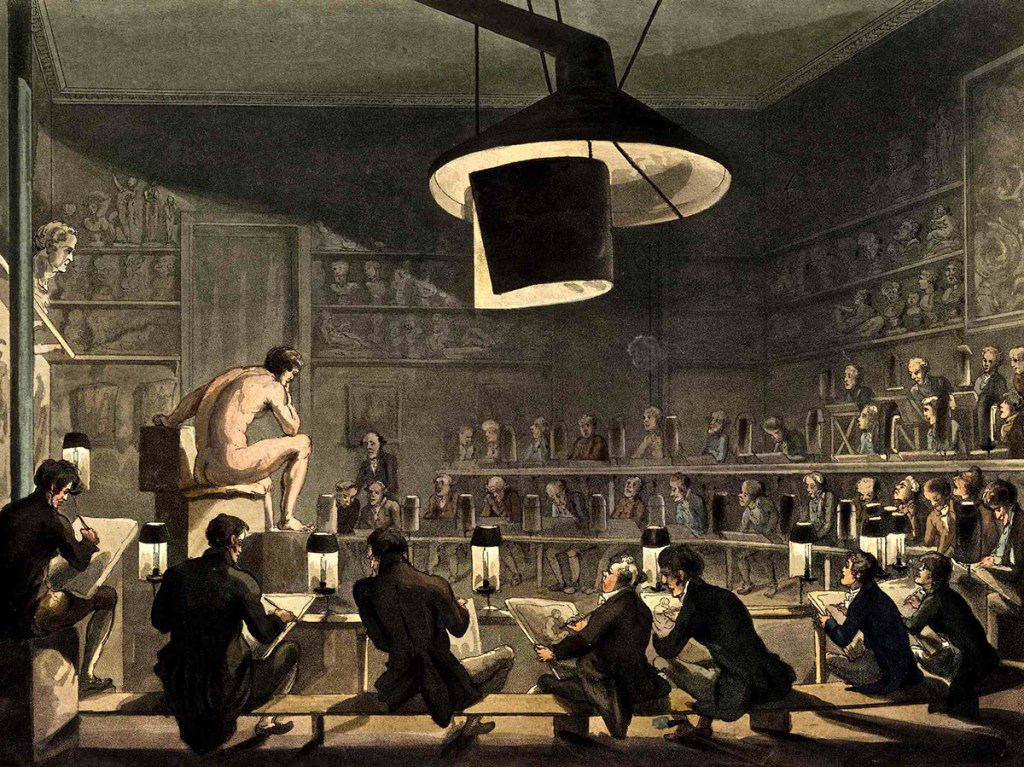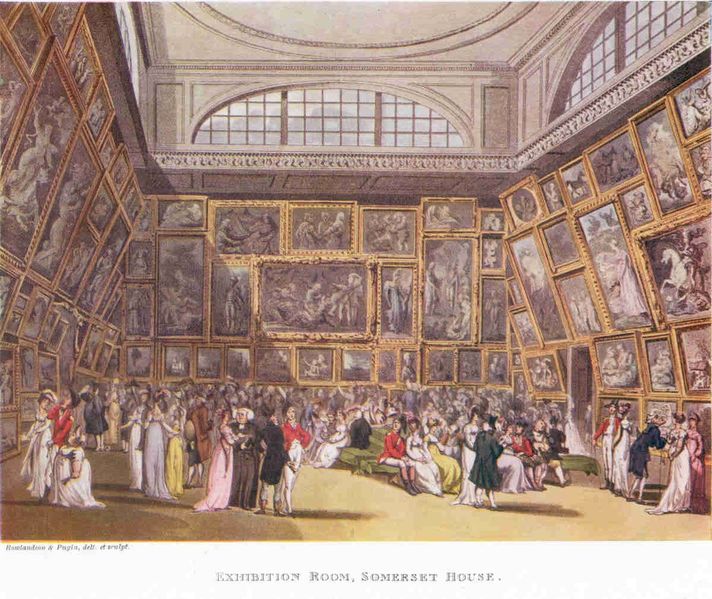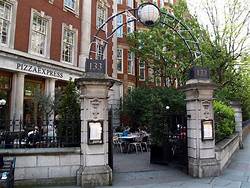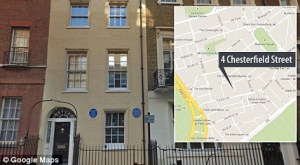published by Rudolph Ackermann in 3 volumes, 1808–1811.
The Admiralty is a brick building, containing the office and apartments for the lords commissioners of the Admiralty, who superintend the marine department, and is contiguous to the Horse Guards on the north. With respect to the architecture, the principal front facing Parliament-street displays a proof that the noble lord and board who presided at the time it was built, had objects of more consequence than symmetry and proportion to attend to: it was designed and erected by Shipley. The screen in the front (which was designed and erected by Adams) is so peculiarly elegant, that it in a degree redeems the other part from disgrace. On the top of the Admiralty are erected two telegraphs, the inside of which may be seen by proper application to the porter, or person who works the machine.
The lord high admiral is classed as the ninth and last great officer of the crown; and the honour it conferred, and trust it vested, were formerly considered to be so great, that the post was usually given either to some of the king’s younger sons, near kinsmen, or one of the chief of the nobility. To the lord high admiral belongeth the cognizance of contracts, pleas, or quarrels made upon the sea, or any part thereof which is not within any county of the realm; for his jurisdiction is wholly confined to the sea. The court is provided for the trial and punishment of all offences committed on the high seas, and is a civil court. Courts-martial in the Admiralty have a judge advocate appointed to assist them. The present judge of the Admiralty is the Right Honourable Sir William Scott, Knight, LL. D. the salary 2500/. The present king’s advocate general is Sir John Nicholl, Knight, LL. D.
In King Henry III.’s days, and in the reigns of Edward I. II. and III. Richard II. Henry IV. V. and VI. there were several admirals; for the cautious wisdom of those days would not trust a subject with so great a charge, nor permit any one man to have a certain estate in a post of so great importance. But, nevertheless, in those days there was a great admiral of England.
King Henry VL in the fourteenth year of his reign, constituted John Holland Duke of Exeter, and Henry Holland his son, admirals of England, Ireland, and Aquitaine for life.
The power of this great officer is described in a statute of Charles II.: it is enacted that he may grant commissions to inferior vice-admirals, or commanders in chief of any squadron of ships, to call and assemble courts-martial, consisting of commanders and captains; and no court-martial, where the pains of death are inflicted, shall consist of less than five captains at least; the admiral’s lieutenant to be as to this purpose esteemed as a captain: and in no case when sentence of death shall pass, by virtue of the articles (for regulating and better governing his majesty’s navies, ships of war, and forces at sea,) aforesaid, or any of them (except in case of mutiny), there shall be execution of such sentence of death, without leave of the lord high admiral, if the offence be committed within the narrow seas. But in case any of the offences aforesaid be committed in any voyage beyond the narrow seas, whereupon sentence of death shall be given in pursuance of the aforesaid articles, or any of them, then execution shall be done by order of the commander in chief of that fleet or squadron wherein sentence was passed.
He hath also power to appoint coroners to view dead bodies found on the seacoast or at sea; commissioners or judges for exercising justice in the High Court, of Admiralty; to imprison and to release, &c.
Moreover to him belong, by law and custom, all fines and forfeitures of all transgressors at sea, on the seashore, in ports, and from the first bridge on rivers towards the sea; also the goods of pirates and felons, condemned or outlawed; and all waifs, stray goods, wrecks of sea deodands; a share of all lawful prizes, lagon, jetson, flotson; that is, goods lying in the sea, goods cast by the sea on the shore, not granted formerly, or belonging to lords of manors adjoining to the sea; all great fishes, as sea-hogs, and other fishes of extraordinary bigness, called royal fishes, whales only and sturgeons excepted.
“De sturgeoni observatur quod rex ilua intergram: de balneo vero sufficit si rex habeat caput et reginse candum.” Master William Prynne, who is one of the commentators upon the above curious law, says, that the reason must be, that “our wise and learned lawgivers willed the queen to have the tail of the whale, that her majesty might have whalebone to make her stays forgetting that this was made law upwards of two hundred years before stays were ever worn or thought of. Note farther, that the bone used for stays, is taken out of the head, and not the tail of the fish.
On this ancient law being once mentioned to the late Dr. Buchan, author of Domestic Medicine, ike. &c. he repeated the following little impromptu, which I think has never before been printed:
“If a sturgeon should chance to be cast upon land,
“Honest George, Heaven bless him! the whole may command;
“But if equal misfortune befal a poor whale,
“Let the king have the head, and the queen the tail.”
It is not the object of this volume to say much concerning the great power and interest which the king of England hath in the British seas; and as to the antiquity of the Admiralty Court, and of the name of Admiral, it may be found in a record mentioned by the Lord Chief Justice Coke (Coke’s Institute, p. 142, entitled “De Superioritate Maris Angliae, et Jure Officii Admiralitatis in eodem), said to be among the archives in the Tower of London.
He is called admiral from amir, an Arabic word signifying prefect us, and in Greek marimis. His patent formerly run thus: “Anglise, Hiberniee, et Aquitaiise magnus admirallus, et praTectus generalis clargis et marium dictorum regnorum.”
The various distinguished actions which have been recorded of many of our admirals, and establish the honour and superiority of the British navy, would fill volumes. To enumerate them would occupy more space than can be here allotted to it, and does not come into the plan of this work; but to close the recital of any thing tending to the establishment of our naval character, without inserting the name of the late Lord Nelson, -would be a very improper omission.
Painters have exhausted their art in pictured representations of his actions; sculptors have hewn marble monuments to eternize his heroic professional abilities, which have been placed in the most conspicuous situations in different public buildings throughout the kingdom; and poets have invoked the muse, and exerted their utmost efforts to perpetuate his fame, in praises that, used to any other individual, might have been deemed extravagant panegyric: but the whole nation appear to have been so gratefully alive to his exalted merit, and so highly to revere his memory, that it is hardly deemed equal to what his conduct peremptorily claimed from his surviving countrymen. The Right Honourable Horatio Viscount Nelson, and Duke of Bronte, was a most active, brave, and able officer. He defeated the French fleet in Aboukir Bay, August 1, 1798, and took eight sail of the line; for which he was raised to the peerage. He was second in command at the battle of Copenhagen, where he displayed great courage and conduct; for which he was raised to the dignity of viscount. He completely defeated the combined fleet of France and Spain, off Cape Trafalgar, October 21, 1805, in which he lost his life.
In the advices some of our admirals have transmitted to the Board of Admiralty and others, there is a brevity, which Shakespeare says is the soul of wit; there is, however, a brevity, which is so admirable a model of epistolary writing, that I cannot resist transcribing one or two of them; premising, that as they are taken from memory, they may not do justice to the originals.
The first is from Sir George Rodney to the Governor of Barbadoes, and is as follows:
“Dear General,
“The battle is fought, — the day is ours, — the English flag is victorious; — we have taken the French admiral, with nine other ships, and sunk one. “G. B. R.”
The second letter was, I think, transmitted to the Admiralty.
“We have met the French fleet, and taken, sunk, or destroyed, as per margin.”
The last I shall subjoin is from a foreigner, but seems mixed up with a large portion of British spirit . It was written to Admiral Benbow, who died in October 1702, at Jamaica, of the wounds he received in an engagement with M. du Casse, in the West Indies, off the high land of St. Martha, in the same year.
Soon after Admiral Benbow’s return to Jamaica, he received a letter from M. du Casse, of which the following is a translation:
“Carthagena, August 1702.
“Sir,
“I had little hopes on Monday last but to have supped in your cabin; yet it pleased God to order otherwise: I am thankful for it. As for those cowardly captains who deserted you, hang them up; for, by G — d, they deserve it.
“Du Casse.”
The next print is a correct interior view of THE BOARD ROOM OF THE ADMIRALTY, with its appropriate decorations of globes, books, maps, & c. The lords commissioners are represented as sitting at the table, and may be naturally supposed engaged in some business relative to the naval interest of Great Britain: and considered in that point of view, may be fairly said to be transacting a business of more real importance to this country, than any other subject that could be debated; and if taken in all its nautical relations, the acknowledged preeminence of our navy, and the various appertaining et-ceteras, it is also a matter of infinite importance to all Europe.

After what has been said, it does not seem necessary to make any remarks on the extent of the building; but, as it has been before remarked, that the noble lords were engaged in transactions of more importance than attending to the symmetry and proportion of their house, which was probably left to the architect, who might in many cases leave it to the management of his foreman, it may afford some amusement to our readers, to recite a few sportive sallies of the wits of the time on the brick and mortar of the principal front.
They said, and truly said, that it is a contemptible piece of architecture. Of the portico of this building, composed of four Ionic columns, with a pediment of stone, a story is told, that, from the strange disproportion of the shafts, is highly probable. The architect, Shipley, had made them of a proper length, when it was found that the pediment of one of his shafts had blocked up the window of one of the principal apartments; and he endeavoured to remedy the error, by carrying his columns to the roof of the building: and in truth, in its present state, one is compelled to admit the truth of what was remarked by the late George Selwyn, that though the columns are certainly neither of the Doric, Ionic, or Corinthian order, they would be admirable models to take for a new one, which might be denominated the clis, or disproportioned order; “or,” added he, “if we chose to give it immortality, baptize it with an appropriate title, and name it the Robinsonian order, in honour of Sir Thomas Robinson.”
The figure of Sir Thomas Robinson must be in the recollection of many of our readers; — so long, so lank, so lean, so bony, that he struck every one who saw him, as distinct from all other men, and out of all manner of proportion. When the late Lord Chesterfield was confined to his room by an illness, of which he felt a consciousness that he should never recover, a friend, who visited him in the character of one of Job’s comforters, gravely said, he was sorry to tell his lordship, that every body agreed in thinking he was dying, and that he was dying by inches. “Am I?” said the old peer, “am I indeed? why then I rejoice from the bottom of my soul, that I am not near so tall as Sir Thomas Robinson.”
To return to the building: certain it is that such columns never were seen either in Greece, or Rome, or any other country.
The screen in the front, which was designed and erected by Adams, is so far from being liable to any part of this censure, that it forms a striking contrast, and would, if it were possible, shew in a more glaring light the gross absurdities of the principal front of the building.
On the inside of the Admiralty are two telegraphs, which may be seen by a proper application to the porter, or person who works, the machine.
More about the Admiralty Boardroom.














